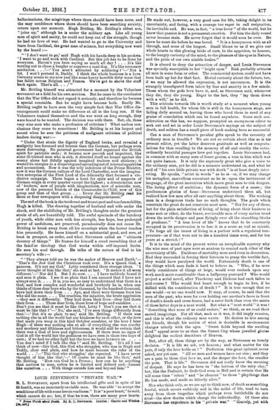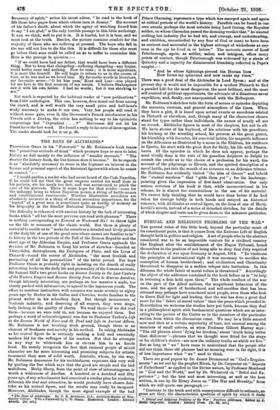LOUIS STEVENSON'S " PRIVATE WAR."' L STEVENSON, apart from his
intellectual gifts and in spite of his Ill-health, was an immensely enviable man. He was able " to accept the conditions of life with some heroic readiness." It is "a poor heart," he said, which cannot do so; but, if that be true, there are many poor hearts.
• Brow Words about Drab.By B. L. Stevenson. London ; Matte awl Windom. Vs. /sots]
He made out, however, a very good case for life, taking delight in its uncertainty, and facing, with a courage too eager to call resignation, its inevitable end. He was, in fact, " a true lover " of the world, but he knew that passion is not a permanent emotion. For him the daily round never became stale. He never forgot that it would soon be over. He knew he must die before he was bored. " It is a honeymoon with us all through, and none of the longest. Small blame to us if we give our whole hearts to this glowing bride of ours, to the appetites, to honour, to the hungry curiosity of the mind, to the pleasure of the eyes in Nature, and the pride of our own nimble bodies."
It is absurd to deny the attraction of danger, and Louis Stevenson was specially susceptible to her " bright eyes." Risk probably attracts' all men in some form or other. The commercial system could not have been built up but for that fact. Mortal curiosity about the future, too, if we may be allowed the expression, is not uncommon. It is the strangely transfigured form taken by fear and anxiety in a few minds. Those whom the gods love have it, and, as Stevenson said, whenever they die, they die young. Eager to the last, they " lay them down with a will," as he did.
This attitude towards life is worth study at a moment when young men in full health, for whom life is still in the honeymoon stage, are falling daily around us, leaving those who loved them in need of any grains of consolation which can be found anywhere. Some such con- sideration as this has, we suppose, prompted an anonymous editor to seek out and set in order Louis Stevenson's sayings on the subject of death, and seldom has a small piece of book-making been so successful.
Can a man of Stevenson's peculiar gifts speak to the necessity of ordinary men in trouble ? We are not so certain about this as is his present editor, yet-the latter deserves gratitude as well as congratu- lations for thus recalling to the memory of all and sundry the extra- ordinarily beautiful passages here put together. Louis Stevenson had, in common with so many men of lesser genius, a vein in him which was not quite human. It is only the supremely groat who give a voice to the ordinary man, yet he did in a measure understand us, and what he said of " his own little private war with death " is at least deeply inter- esting. He speaks, " artist in words " as he is—or, if we may change his metaphor, marvellous executant as he is—upon the instrument of language, of the great incentives which move great men to risk dangers. The luring glitter of ambition ; the dynamio force of a cause ; the posthumous glories of fame—Stevenson understood them all, but realized how few men after all care anything about them. The working man in a dangerous trade has no such thoughts. The goals which constrain the great do not constrain most men. " Not for any of these, but for the plain satisfaction of living, of being about their business in some sort or other, do the brave, serviceable men of every nation tread down the nettle danger and pass flyingly over all the stumbling-blocks of prudence." " A true lover of life " knows that to be constantly occupied in its preservation is to lose it in a sense as real as suicide. " To forgo all the issues of living in a parlour with a regulated tem- perature—as if that were not to die a hundred times over, and for ton years at a stretch I "
It is to the mind of the present writer an inexplicable mystery why the wise men of past ages were so anxious to remind eaoh other of the uncertainty of life. Emblems of mortality were used even in decoration. Had they succeeded in forcing their listeners to grasp the terrible fact, they would have paralysed the world. Fortunately death is one of the things which man finds it hard to believe in. " Who, if he were wisely considerate of things at large, would ever embark upon any work much more considerable than a halfpenny postcard 7 Who would project a serial novel, after Thackeray and Dickens had each fallen in mid-course ? Who would find heart enough to begin to live, if he dallied with the consideration of death 7 " It is true enough that no one would—or no one would now. It may, of course, be said that the men of the past, who were for ever holding one another's faces in front of death's-heads and cross-bones, had a surer faith than even the saints of these latter days in a next world. But what a " next world " it was " Something that none of us could endure," we think, as we read their sacred imaginings. For all that, such as it was, it did imply reunion, and this is what the ordinary man wants. He desires to live among his friends, though his notion of what is desirable in environment changes utterly with the ages. " Sweet fields beyond the swelling flood " appeal more to us than the Sunset City whose jewelled glories delighted the earliest describers of Heaven.
But, after all, these things are by the way, as Stevenson so tersely declares. " It is life we ask, not heaven ; and what matter for the pain, if only the love holds on ? " Perfection this great optimist never asked, nor yet ease. " All we men and women have our sins ; and they are a pain to those that love us, and the deeper the love, the crueller the pain. That is life." Stevenson did not really know the moaning of despair. He says he has been to " the bottom of the miry clay," but, like the Psalmist, he finds God even in Hell and is certain that He will some time " relent " and " be clement " to those " playthings that He has made, and made so bitterly alive."
Men who think only, as we are apt to think now, of death as something fearful, which occurs suddenly and in tho midst of life, tend to turn
away from those tragedies which perhaps even battlefields do not rival—the slow deaths which change the individuality. Of these also Stevenson Las exPerienee in his " private was." " Gravely, yet with buoyancy of spirit," writes his latest editor, " he read in the book of life those later pages from which others turn in dismay." His account of his father's death, about which the agony of watching forced him to say " I am glad," is the only terrible passage in this little anthology. It was, we think, well to put it in. It is fearful, but it is true, and we must look at the truth. Besides, the picture contains comfort for the majority of those who are suffering at present. The boys who fall in the war will not live to die like this. It is difficult for those who must go before their sons could be called on so to suffer to remember this. Hero is the passage in question :— " If we could have had my father, that would have been a different thing. But to keep that changeling—suffering changeling—any longer, could better none and nothing. Now he rests ; it is more significant, it is more like himself. Ho will begin to return to us in the course of time, as he was and as wo loved him. My favourite words in literature, my favourite scene—' 0 let him pass,' Kent and Lear—was played for me hero in the first moment of my return. I believe Shakespeare saw it with his own father. I had no words ; but it was shocking to see."
Not much is expected by the habitual reader of "new publications" from Lttle anthologies. This one, however, does stand out from among the crowd, and is well worth the very small price and half-hour's study necessary to make it our own. Very few people will read it without some gain, even if, like Stevenson's French interlocutor in his Travels with a Donkey, the critic has nothing to say to his optimistio outpourings but " Cependant . . . 7" Stevenson did not let his friend have the last word. Ho found a reply to his note of interrogation. The reader should look for it on p. 30.



































 Previous page
Previous page